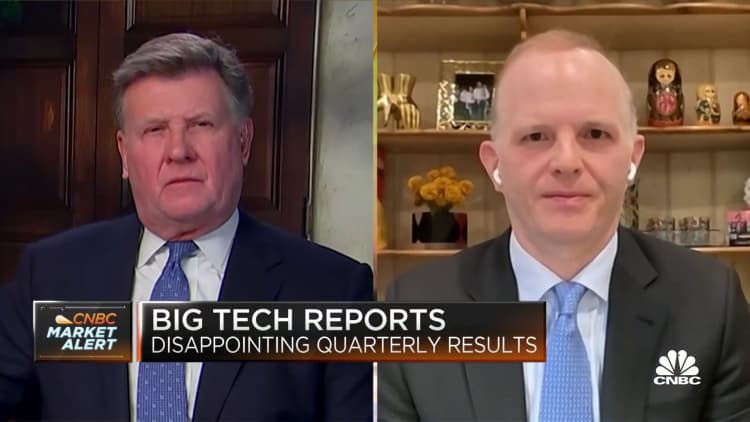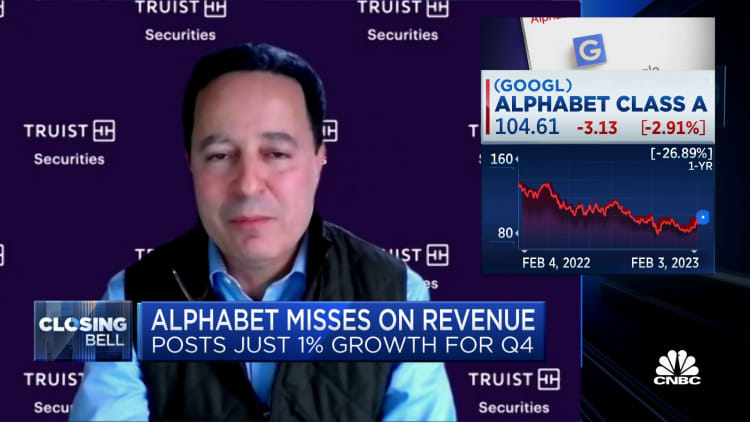Tech stocks just finished a five-week rally — the longest stretch since market peak in Nov. 2021
Tech stocks on display at the Nasdaq.
Peter Kramer | CNBC
The Nasdaq just wrapped up its fifth straight week of gains, jumping 3.3% over the last five days. It’s the longest weekly winning streak for the tech-laden index since a stretch that ended in Nov. 2021. Coming off its worst year since 2008, the Nasdaq is up 15% to start 2023.
The last time tech stocks enjoyed a rally this long, investors were gearing up for electric carmaker Rivian’s blockbuster IPO, the U.S. economy was closing out its strongest year for growth since 1984 and the Nasdaq was trading at a record.
This time around, there’s far less champagne popping. Cost cuts have replaced growth on Wall Street’s checklist, and tech executives are being celebrated for efficiency over innovation. The IPO market is dead. Layoffs are abundant.
Earnings reports were the story of the week, with results landing from many of the world’s most valuable tech companies. But the numbers, for the most part, weren’t good.
Apple missed estimates for the first time since 2016, Facebook parent Meta recorded a third straight quarter of declining revenue, Google‘s core advertising business shrank and Amazon closed out its weakest year for growth in its 25-year history as a public company.
While investors had mixed reactions to the individual reports, all four stocks closed the week with solid gains, as did Microsoft, which reported earnings the prior week and issued lackluster guidance in projecting revenue growth this quarter of only about 3%.
Cost control is king
Meta was the top performer among the group this week, with the stock soaring 23%, its third-best week ever. In its earnings report on Wednesday, revenue came in slightly above estimates, even with sales down year over year, and the first-quarter forecast was roughly inline with expectations.
The key to the rally was CEO Mark Zuckerberg’s pronouncement in the earnings statement that 2023 would be the “Year of Efficiency” and his promise that “we’re focused on becoming a stronger and more nimble organization.”
“That was really the game-changer,” said Stephanie Link, chief investment strategist at Hightower Advisors, in an interview on Friday with CNBC’s “Squawk Box.”
“The quarter itself was OK but it was the cost-cutting that they finally got religion on, and that’s why I think Meta really took off.”

Zuckerberg acknowledged that the times are changing. From the year of its IPO in 2012 through 2021, the company grew between 22% and 58% a year. But in 2022 revenue fell 1%, and analysts expect growth of only 5% in 2023, according to Refinitiv.
On the earnings call, Zuckerberg said he doesn’t expect declines to continue, “but I also don’t think it’s going to go back to the way it was before.” Meta announced in November the elimination of 11,000 jobs, or 13% of its workforce.
Link said the reason Meta’s stock got such a big bounce after earnings was because “expectations were so low and the valuation was so compelling.” The stock lost almost two-thirds of its value last year, far more than its mega-cap peers.
Navigating ‘very difficult environment’
Apple, which slid 27% last year, gained 6.2% this week despite reporting its steepest drop in revenue in seven years. CEO Tim Cook said results were hurt by a strong dollar, production issues in China affecting the iPhone 14 Pro and iPhone 14 Pro Max, and the overall macroeconomic environment.
“Apple is navigating what is of course a very difficult environment quite well overall,” Dan Flax, an analyst at Neuberger Berman, told “Squawk Box” on Friday. “As we move through the coming months and quarters, we’ll see a return to growth and the market will begin to discount that. We continue to like the name even in the face of these macro challenges.”

Amazon CEO Andy Jassy, who succeeded Jeff Bezos in mid-2021, took the unusual step of joining the earnings call with analysts on Thursday after his company issued a weaker-than-expected forecast for the first quarter. In January, Amazon began layoffs, which are expected to result in the loss of over 18,000 jobs.
“Given this last quarter was the end of my first full year in this role and given some of the unusual parts in the economy and our business, I thought this might be a good one to join,” Jassy said on the call.
Managing expenses has become a big theme for Amazon, which expanded rapidly during the pandemic and subsequently admitted that it hired too many people during that period.
“We’re working really hard to streamline our costs,” Jassy said.
Alphabet is also in downsizing mode. The company announced last month that it’s slashing 12,000 jobs. Its revenue miss for the fourth quarter included disappointing sales at YouTube from a pullback in ad spending and weakness in the cloud division as businesses tighten their belts.
Ruth Porat, Alphabet’s finance chief, told CNBC’s Deirdre Bosa that the company is meaningfully slowing the pace of hiring in an effort to deliver long-term profitable growth.
Alphabet shares ended the week up 5.4% even after giving up some of its gains during Friday’s selloff. The stock is now up 19% for the year.
Ruth Porat, Alphabet CFO, at the WEF in Davos, Switzerland on May 23rd, 2022.
Adam Galica | CNBC
Should the Nasdaq continue its upward trend and notch a sixth week of gains, it would match the longest rally since a stretch that ended in January 2020, just before the Covid pandemic hit the U.S.
Investors will now turn to earnings reports from smaller companies. Some of the names they’ll hear from next week include Pinterest, Robinhood, Affirm and Cloudflare.
Another area in tech that flourished this week was the semiconductor space. Similar to the consumer tech companies, there wasn’t much by way of growth to excite Wall Street.
AMD on Tuesday beat on sales and profit but guided analysts to a 10% year-over-year decline in revenue for the current quarter. Intel, AMD’s primary competitor, reported a disastrous quarter last week and projected a 40% decline in sales in the March quarter.
Still, AMD jumped 14% for the week and Intel rose almost 8%. Texas Instruments and Nvidia also notched nice gains.
The semiconductor industry is dealing with a glut of extra parts at PC and server makers and falling prices for components like memory and central processors. But after a miserable year in 2022, the stocks are rebounding on signs that an easing of Federal Reserve rate increases and lightening inflation numbers will give the companies a boost later this year.
WATCH: Watch CNBC’s full interview with Truist’s Youssef Squali

For all the latest Technology News Click Here
For the latest news and updates, follow us on Google News.

